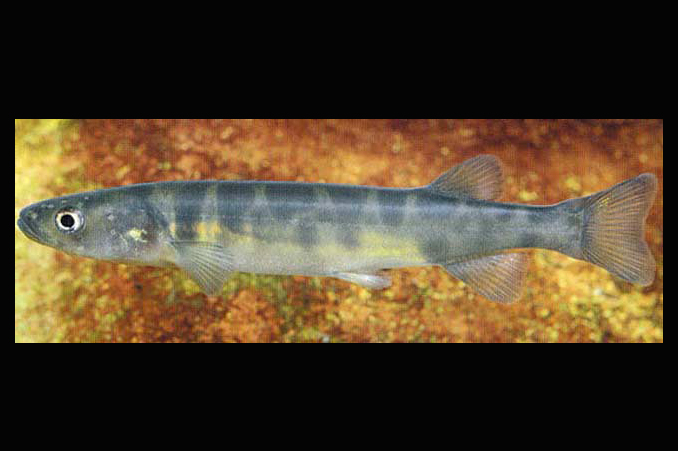- Classification
- ACTINOPTERYGII
- SALMONIFORMES
- GALAXIIDAE
- Galaxias
- tanycephalus
Saddled Galaxias, Galaxias tanycephalus Fulton 1978

Saddled Galaxias, Galaxias tanycephalus. Source: Gunther Schmida. License: All rights reserved
Saddled Galaxias, Galaxias tanycephalus Fulton 1978
More Info
|
Distribution |
Woods Lake and Arthurs Lake on the Central Plateau, Tasmania. In 2018, the species was found in nearby Little Lake and one individual in Gunns Lake, both of which are connected to the Arthurs Lake population by a small connecting stream. Mostly occurs in the lakes, with a few individuals found in the lower reaches of inflow streams. Adults prefer areas where rocks and aquatic vegetation provide shelter. Larvae and juveniles form schools in open water. |
|
Features |
Dorsal fin 11-13; Anal fin 13-16; Pectoral fin 14-17; Gill rakers (first arch) 16-21; Vertebrae 53-56. Stout, bullet-shaped body; long head tapering to a long slender snout; mouth large, gape reaching in front of eye depth at vent 6.3-7.5 in SL; lower jaw slightly protruding; jaws with slightly enlarged lateral canines; eye dorsolateral, moderate in size; mouth opening obliquely; lips fleshy; caudal peduncle long and slender. Scales absent. Caudal fin emarginate; dorsal and anal fins small; dorsal fin well behind ventral fins, origin above vent just in front of anal fin origin. |
|
Size |
To 14.5 cm SL, commonly 7-8 cm. |
|
Colour |
Olive green to grey overall, sometimes with a purplish sheen on the sides. A series of darker grey saddle-like markings on back and upper sides with a silvery belly. Fins olive to amber. |
|
Feeding |
Adults feed on insects and crustaceans; pelagic juveniles are likely to feed on zooplankton. |
|
Biology |
This species does not migrate, and the lifecycle is completed in freshwater. Spawning occurs throughout the year with a peak late in spring. |
|
Conservation |
IUCN: Critically EndangeredEPBC Act 1999: Vulnerable Brown Trout prey heavily on Saddled Galaxias, and are considered to limit the population - estimated to have undergone an 80% decline in the decade prior to 2018. |
|
Etymology |
The specific name tanycephalus is from the Greek tany (= stretched out, long) and kephale (= head), in reference to the characteristic long, slender head of this species, that is narrower than the related Galaxias truttaceus and G. auratus. |
|
Species Citation |
Galaxias tanycephalus Fulton 1978, Australian Journal of Marine and Freshwater Research 29(1): 109-116. Type locality: Arthur's Lake, 41°59'S, Tasmania. |
|
Author |
Gomon, M.F. & Bray, D.J. 2025 |
|
Resources |
Saddled Galaxias, Galaxias tanycephalus Fulton 1978
References
Adams, M., Hammer, M.P., Unmack, P.J., Raadik, T.A., et al. 2023. Multi-gene insights into the taxonomy and conservation of Tasmania’s galaxiid fishes. Marine and Freshwater Research 74(13): 1113-1128 https://doi.org/10.1071/MF22263
Allen, G.R. 1989. Freshwater fishes of Australia. Neptune City, New Jersey : T.F.H. Publications, Inc.
Allen, G.R., Midgley, S.H. & Allen, M. 2002. Field Guide to the Freshwater Fishes of Australia. Perth : Western Australian Museum 394 pp.
Freeman, R. 2019. Galaxias tanycephalus. The IUCN Red List of Threatened Species 2019: e.T8809A129041479. https://dx.doi.org/10.2305/IUCN.UK.2019-3.RLTS.T8809A129041479.en. Accessed on 23 January 2025.
Freeman, R. & Wisniewski, J. 2024. Inland Fisheries Service Native Fish Conservation – Annual Report 2023-24. Inland Fisheries Service, Hobart, Tassmania, 24 pp.
Fulton, W. 1978. A description of a new species of Galaxias (Salmoniformes : Galaxiidae) from Tasmania. Australian Journal of Marine and Freshwater Research 29(1): 109-116 https://doi.org/10.1071/MF9780109
McDowall, R.M. 2006. Crying wolf, crying foul, or crying shame: alien salmonids and a biodiversity crisis in the southern cool-temperate galaxioid fishes? Reviews in Fish Biology and Fisheries 16: 233-422
McDowall, R.M. & Frankenberg, R.S. 1981. The galaxiid fishes of Australia. Records of the Australian Museum 33(10): 443-605 figs 1-47
McDowall, R.M. & Fulton, W. 1996. Chapter 10. Family Galaxiidae — galaxiids. pp. 52-77 in McDowall, R.M. (ed.) Freshwater Fishes of South-eastern Australia. Sydney : Reed Books 247 pp.
Merrick, J.R. & Schmida, G.E. 1984. Australian Freshwater Fishes Biology and Management. Sydney : J.R. Merrick 409 pp. figs 280 col. figs.
Raadik, T.A. 2011. Systematic revision of the Mountain Galaxias, Galaxias olidus Günther, 1866 species complex (Teleostei: Galaxiidae) in eastern Australia. Ph.D thesis, University of Canberra. pp. i-xxiii, 1-493 [395]
Raadik, T.A. 2014. Fifteen from one: a revision of the Galaxias olidus Günther, 1866 complex (Teleostei, Galaxiidae) in south-eastern Australia recognises three previously described taxa and describes 12 new species. Zootaxa 3898(1): 1-198



